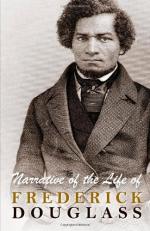|
This section contains 7,458 words (approx. 25 pages at 300 words per page) |

|
SOURCE: Rowe, John Carlos. “Between Politics and Poetics: Frederick Douglass and Postmodernity.” In Reconstructing American Literary and Historical Studies, edited by Günter H. Lenz, Hartmut Keil, and Sabine Bröck-Sallah, pp. 192-210. Frankfurt am Main: Campus Verlag, 1990.
In the following essay, Rowe discusses Douglass's Narrative as an important text not just in the literary history of America, but also in the country's political and economic history.
Douglass has subverted the terms of the code he was meant to mediate: He has been a trickster.
Henry Louis Gates, Jr.
Frederick Douglass didn't even get a brief mention in the Spiller, Thorp, Johnson, Canby, and Ludwig Literary History of the United States of 1946. Although he figures centrally in Carolyn Porter's fine “Social Discourse and Nonfictional Prose” for the new Columbia Literary History of the United States, his 1845 Narrative of the Life of Frederick Douglass, an American Slave is celebrated...
|
This section contains 7,458 words (approx. 25 pages at 300 words per page) |

|


